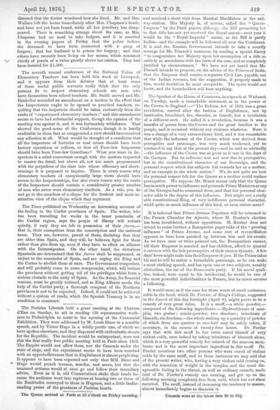The Speaker of the House of Commons, in a speech
at Wisbeach on Tuesday, made a remarkable statement as to the power of the Crown in England :—" The Reform Act of 1832 was a great revolution, carried after the fashion of Englishmen, not, by barricades, bloodshed, fire, disorder, or tumult, but a revolution of a different sort. He called it a revolution, because it was a transfer of power from the Crown and the great families to the people, and it occurred without any violence whatever. Now, it was a change of a very extraordinary kind, and it was remarkable that while the influence of the Crown, which was derived from prerogative and patronage, was very much weakened, yet he ventured to say that at the present day—and he said so advisedly —the influence of the Crown was as great as it was in the days of the Georges. But its influence was not now due to prerogative, but to the constitutional character of our Sovereign, and the personal respect which her subjects felt towards her as a mother, and an example to the whole nation." We do not quite see how the personal respect felt for the Queen as a mother could replace prerogative. We suppose Mr. Brand means only that the Queen has as much power to influence and persuade Prime Ministers as any of the Georges had to command them, and that her personal char- acter adds to the degree of this influence. But might not a really able constitutional King, of very indifferent personal character, wield quite as much influence of this kind, or even rather more?






























 Previous page
Previous page